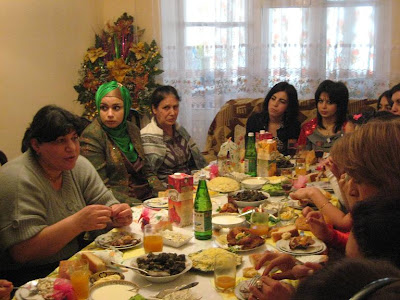




This past week has been the celebration of Novruz, the new year for the earth. It is the beginning of Spring when the plants turn green and life is renewed. Old mistakes are forgotten, and new opportunities are seized. Part of the celebration in Shirvan is the planting of flowers, and we wanted to share the photos with everyone.
Certainly one of aspects of life in the United States that we miss is the freedom and independence that an automobile brings. We are at the mercy of public transportation and it has brought us to a new appreciation for all those dependent on public transportation in the United States. The buses here do not run on schedules, but at the descretion of the driver who wants a full bus. Someone pays the right to run a route and then keeps any income - so the more full and more people the more lucrative. We find it very uncomfortable, but for us it is only inconvenient. Linda recently went to Salyan to visit another PCV. Linda was on the bus awaiting departure when an elderly heavy woman tried to get on the bus. As hard as she could try to step up, she could not, and finally put her knee on the step and literally crawled up the steps of the bus. Her stop? She stopped at the cemetary on the outskirts of one of the villages to visit the graves of family during the holiday.
Often the older women in Azerbaijan are very heavy. It is due to a lifestyle of no exercise, poor diet, and economy. To eat healthy foods is very expensive in all cultures and countries.
On the good news/bad news genre, we have downloaded SKYPE software and have used it to make calls to the United States for only 2 cents a minute. The bad news is that at times our internet connection which is dial up is insuffecient to carry the voice satisfactorily. When I am at the library I will be able to use it more successfully, but with the 10 hour difference in time to the central time zone, not very realistic. If you have used SKYPE and have any advice for us, let us know.
Now, good news/good news! The Peace Corps has three goals and the third goal is for Volunteers to share with people in the United States about the cultures in which we live. Two weeks ago, we received a wonderful package and letter from Richard and Gloria Bray. Gloria wrote, about watching the opening ceremonies at the Winter Olympics. She noted with excitement the entrance of the 2 Azerbaijan athletes. She wrote that many more people now know where Azerbaijan is and about its culture because of our blog and letters. That lifted our spirits immeasurably as we realized that we are fulfilling that third goal. Thank all of you for your caring.
The other good news is that in Afghanistan there have been 3,500 laptop computers distributed to students through One Laptop Per Child (OLPC, www.laptop.org). We firmly believe that the defeat of terrorism is dependent upon the education of young people, especially girls. The making of women second class citizens is wrong wherever in the world. (Note: women in Azerbaijan had the right to vote before the women of the United States.) You can find more information at the website listed above.
My mistake - last week I said that due to Daylight Savings Time we were 11 hours ahead - that should have been 9 hours, and after Sunday we will be back to 10 hours difference.














